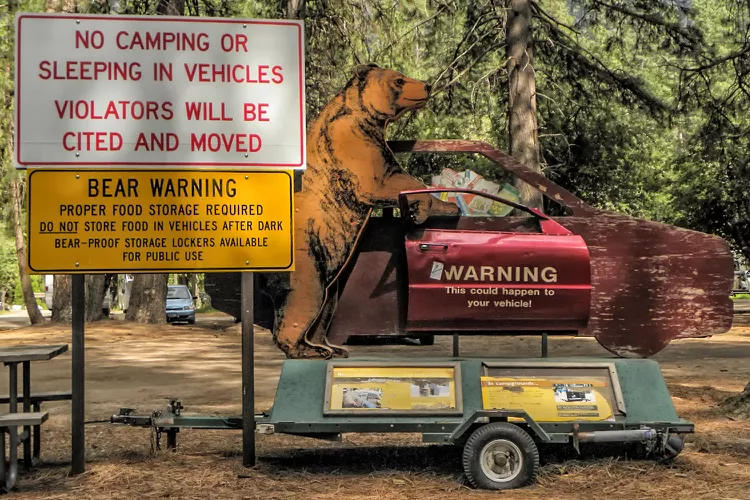Summary
Bears and Camping Safety in Yosemite and Sequoia-Kings Canyon
Bears can pose significant challenges for campers in Yosemite National Park and Sequoia-Kings Canyon National Park, where these animals frequently break into parked cars. In fact, over 1,300 vehicles were damaged by bears in Yosemite in 1998. Although incidents have decreased to only a few dozen each year, following safety precautions remains essential for a safe camping experience.
Bear Awareness in Yosemite and Sequoia-Kings Canyon
Bears are generally shy creatures that usually avoid humans. However, once they have tasted human food, it becomes a tempting target. They possess an incredible sense of smell, being able to detect food even when it’s wrapped in plastic and locked in your trunk. Remarkably, some statistics indicate that bears can smell food from distances up to three miles away.
Bears recognize what ice chests look like, which may lead them to attempt to break into a vehicle, even if the ice chest is empty. Furthermore, their strength allows them to easily break windows, bend frames, and break through camper shells to access food. In some cases, they will even manage to get into the passenger area of a vehicle and claw through the back seat to reach food in the trunk.
How to Keep Your Vehicle Bear Safe
It’s crucial not to underestimate a bear’s intelligence when it comes to securing food in your vehicle.
- Never leave food or scented items in your car overnight, as even slight food residues can attract bears.
- Be cautious with items like infant seats, as they often retain food smells.
- Don’t forget non-food items. Many cosmetics and sunscreens, including peppermint lotion or banana-scented suntan oil, can smell like food.
- Other potential attractants include canned drinks, chewing gum, baby wipes, and empty wrappers. Thoroughly check underneath seats, in the glove box, and the center console when cleaning out your vehicle.
- Minivans are particularly vulnerable, as reports indicate bears break into these vehicles more often than others.
Additionally, park rangers may impound vehicles found with food inside them after dark, making it essential to comply with these guidelines.
How to Keep Bears Out of Your Campsite
Even if people are present, bears can and will enter campsites, necessitating proactive measures.
- Follow the initial guidelines regarding food storage in your vehicle.
- If metal bear boxes are available, utilize them to store all food items and anything else that emits food odors, ensuring the box is completely latched.
- If bear boxes are not available, seal all items in plastic to help contain odors. You can also purchase bear-proof containers from retailers like REI.
- For RV camping, keep food out of sight in hard-sided trailers and RVs, and make sure to close all windows, doors, and vents when you leave.
- If there’s a bear-proof locker nearby, consider placing smelly items inside, as the minor inconvenience is far outweighed by potential damage costs.
- For soft-sided campers, implement the same precautions as above while ensuring all food is stored in bear-proof containers.
How to Stay Safe from Bears, Everywhere Else
Bear prevention is also crucial when staying in cabins. Follow all the same precautions: close and lock all doors and windows when you are away, and keep doors shut when inside.
All trash should be disposed of in bear-proof dumpsters or trash cans. This precaution is not only common sense but also a legal requirement in many areas.
If hiking or backpacking, do not underestimate a bear’s ability to outsmart traditional food storage methods such as hanging food in trees. Instead, use portable canisters that weigh less than three pounds and can hold enough food for up to five days. If necessary, you can rent canisters from staffed wilderness permit stations.
If you come across a bear while hiking, do not approach it. Instead, react quickly: wave your arms, yell, clap your hands, bang pots together, and throw small sticks or stones to make noise and scare it away. If you’re with others, stay close together to appear more intimidating.
Maintain a safe distance and avoid encircling the bear; always provide a path for escape. Exercise caution when encountering a mother bear with cubs. Additionally, remember that bringing bear pepper spray to Yosemite is not permitted, as it is classified as a weapon.
If a bear takes any of your belongings or food, do not attempt to retrieve them. Immediately report all bear encounters to a park ranger, which is important for their safety data and to improve patrol efforts in the area.
For further information on bear safety in the park, consider visiting the Yosemite National Park website.





